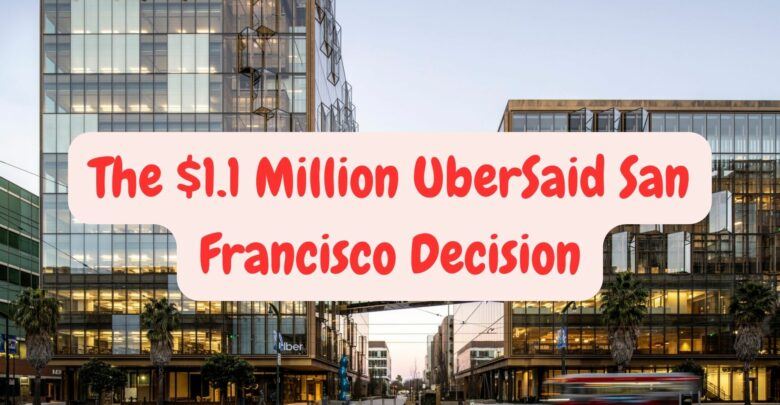Uncategorized
The $1.1 Million UberSaid San Francisco Decision

Introduction:
Uber, the world’s largest ride-hailing company, has faced a number of legal challenges from its drivers who claim that they are employees and thus entitled to benefits such as minimum wage and overtime pay. The company, on the other hand, has maintained that its drivers are independent contractors and therefore not eligible for such benefits.
One such case was brought forward in San Francisco, where a group of drivers claimed that they were owed $1.1 million in expenses. This case was resolved through arbitration, a process in which a neutral third party, known as an arbitrator, is appointed to make a binding decision on the dispute. In this article, we will examine the role of arbitrators in resolving disputes between Uber and its drivers and the implications of the $1.1 million UberSaid San Francisco decision.
What is Arbitration?
Arbitration is a form of alternative dispute resolution (ADR) in which the parties to a dispute agree to have their case heard and decided by an arbitrator. The arbitrator is usually a neutral third party who has expertise in the subject matter of the dispute. Unlike a court of law, the arbitration process is typically faster, less formal, and more confidential.
Arbitration can be either binding or non-binding, depending on the agreement between the parties. In binding arbitration, the decision of the arbitrator is final and binding, and the parties are required to abide by it. In non-binding arbitration, the decision of the arbitrator is advisory and the parties are free to accept or reject it.
The Use of Arbitration in Resolving Disputes Between Uber and its Drivers:
In many cases involving disputes between Uber and its drivers, the company has relied on arbitration agreements to resolve the matter. These agreements, which are typically included in the terms of service between Uber and its drivers, require the drivers to waive their right to a trial by jury and agree to have any disputes resolved through arbitration.
The $1.1 Million UberSaid San Francisco Decision:
The $1.1 million UberSaid San Francisco decision was a landmark case in which a group of drivers claimed that they were owed expenses, such as tolls and vehicle maintenance, by the company. The drivers argued that they were employees, and thus entitled to reimbursement for these expenses under state law.
The case was resolved through arbitration, and the arbitrator found in favor of the drivers, awarding them a total of $1.1 million in expenses. The decision was significant because it marked the first time that an arbitrator had found in favor of Uber drivers in a case involving their classification as employees or independent contractors.
Implications of the $1.1 Million UberSaid San Francisco Decision:
The $1.1 million UberSaid San Francisco decision has significant implications for Uber and its drivers. Firstly, it serves as a reminder that the use of arbitration agreements does not necessarily protect the company from liability in disputes with its drivers. Secondly, the decision provides a potential roadmap for drivers in other jurisdictions who are seeking to challenge their classification as independent contractors.
Conclusion:
The role of arbitrators in resolving disputes between Uber and its drivers is a crucial one, given the number of legal challenges that the company has faced in recent years. The arbitrator uber 1.1m ubersaid san decision serves as a testament to the power of arbitration in resolving such disputes and highlights the importance of considering the implications of such agreements. Ultimately, the decision underscores the need for Uber and its drivers to come to a resolution that adequately addresses the concerns of both parties.
It is important to note that the arbitrator 1.1m ubersaid san decision is just one of many legal challenges that Uber has faced in recent years. The company has faced numerous lawsuits from drivers, as well as government regulators and labor unions, who have raised concerns about its business practices.
Given the significant costs associated with litigating disputes, many companies, including Uber, have turned to arbitration as a way to resolve disputes with their employees or contractors. The outcome of the arbitrator uber 1.1m ubersaid san decision also has implications for the gig economy as a whole. As more and more companies adopt a gig-style business model, the question of whether workers in these industries are employees or independent contractors will continue to be a contentious issue.





